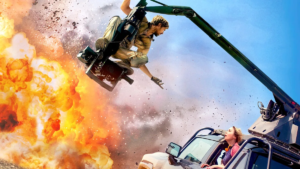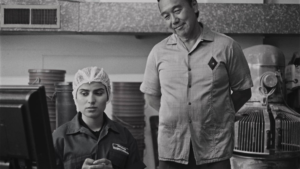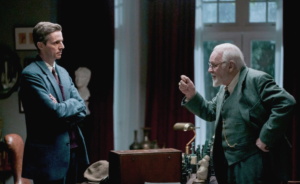Reviewed by GREG KING
Director: Jessica Swale
Stars: Gemma Arterton, Lucas Bond, Gugu Mbatha-Raw, Tom Courtenay, Penelope Wilton, Amada Root, Sian Phillips.

“Stories have to come from somewhere.”
Set against the backdrop of WWII, the wartime drama Summerland is a bit of a tearjerker. It explores themes of love lost and found, family, connections, relationships, prejudice. This is old fashioned story telling but with a contemporary edge.
During the Blitz lots of British children were evacuated from London and housed in rural communities. One such evacuee was Frank (played by newcomer Lucas Bond, from miniseries The Alienist, etc), whose father was an RAF pilot and whose mother was involved in administrative duties. Frank is housed with Alice Lamb (Gemma Arterton), a reclusive researcher who is working on a thesis about myths and legends. She is researching a natural phenomena known as Fata Morgana, an illusion in which a vision of a castle in the sky hovers above the horizon.
The local community regards her as something of an oddball, a witch, as she is a bit of a loner with little time for chitchat and social niceties. At first Alice is reluctant to look after Frank but agrees to take him for a week, giving the authorities time to find another more suitable family. Frank is a curious and intelligent child though and the pair slowly begin to bond as they realise that they have more in common than first thought. But their uneasy relationship is overshadowed by the war itself. Frank also develops a friendship with Edie (Dixie Egerickx), another evacuee with whom he is partnered at school. Alice also comes to learn of the real reason why Frank ended up in her care. Through a series of flashbacks we learn more about the cause of Alice’s unhappiness and solitude.
The film unfolds in three time frames and spans nearly fifty years. When the film opens, we meet the elderly Alice (played by Penelope Wilton) sitting at her typewriter. She is suddenly interrupted by a knock on the door, which then takes us back to the 1940s setting where the younger Alice is disturbed while at her typewriter. During the film we also gets some brief flashbacks to the 20s, when Alice formed an intimate relationship with Vera (Gugu Mbatha-Raw, recently seen in Misbehaviour, etc). But theirs was an impossible relationship given the social strictures of the time, and Vera eventually went off to marry and have a family.
Summerland marks the feature film debut of Olivier award winning writer/director Jessica Swale, who is better known for her work on stage. This is a gentle story that lacks any real deep emotional impact despite the narrative and its destination is a little predictable. There are plenty of light touches, particularly in the first half of the film, but the war is never far away and casts a tragic pall over proceedings.
Swale draws some good performances from her cast. Arterton is solid as Alice and delivers a layered performance that allows her to explore a range of emotions as she forms an emotional connection with Frank. She suffuses the character with a hint of vulnerability as she is transformed by Frank’s presence. Newcomer Bond is also excellent as Frank delivering a confident performance. There is a very strong chemistry between Arterton and Bond that drives the film. Veteran Tom Courtenay is superb in a small but important role as Mr Sullivan, the old fashioned but wise school headmaster who is surprisingly patient and sympathetic with the fractious Alice. Wilton’s presence bookends the main drama, while Mbatha-Raw mainly appears in a brief series of dreamily shot flashbacks and is never really given much to work with.
The period details reek of authenticity and captures the era perfectly, while Christina Moore’s production design is very good. One brief scene takes us into the horrors of the blitz itself, with a residential street devastated by bomb blasts and fires. There is some nice cinematography from Laurie Rose (Ben Wheatley’s frequent collaborator) that captures the pretty scenery of the Kentish seaside. The whimsical score from Volker Bertelmann perfectly complements the tone of the material.
The film’s title comes from Alice’s theory that, before Christianity existed there was a place called Summerland, a pagan equivalent of heaven.
★★★



